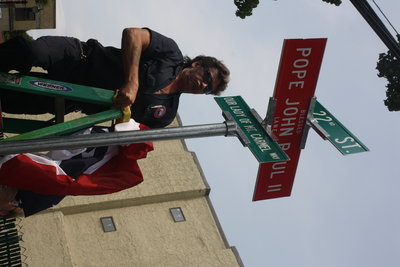“He’s my man!” a woman named Emily yelled out the passenger side window of a van on East 22nd Street on June 11 when she saw the crowd gathered near the opening of Church Lane.
This was not a reaction to pop singer Justin Bieber – who by some accounts is the most popular current music star – nor an impromptu return appearance of movie star Tom Cruise.
No, this woman, along with many others passing through the street a block up from the Hudson Bergen Light Rail Station, discovered that the city was naming the small street near Mt. Carmel Church after the late, great near-saint Pope John Paul II.
Dressed with the red sash signifying his rank in the church, Rev Msgr. Ronald J. Marczewski greeted the assembly of a few dozen people who had come to witness a historic moment for Bayonne’s Christian and non-Christian community, since Pope John Paul II has become not merely a symbol of Catholic unity, but also an icon of faith and determination for more than three decades.
The pope himself
Although better known as Pope John Paul II, Karol Wojtyla, Titular Bishop of Ombi and Auxiliary Bishop of Kraków, became a hero to many Polish-speaking people throughout Bayonne and northern New Jersey, and made several visits to this area during his 27-year term as Pope of the Roman Catholic Church.
His ascension to the Papal seat in 1978 corresponded with the beginning of a Polish social and political revolution called the Solidarity Movement. In a historic address, he is credited with the peaceful revolution that helped end communism. He became a symbol of hope for many in Polish-American communities like Passaic and Bayonne.
Dedicating himself to the priesthood in secret in Nazi-occupied Kraków during World War Two, Wojtyla was ordained in 1946, finished his doctorate in theology in 1948, and on vacations worked and preached to Polish immigrants in France, Belgium and Holland. After 1948, he became vicar to various parishes, and eventually was appointed Auxiliary Bishop in 1958 and Archbishop of Kraków in 1964. Since being named Pope in 1978, Pope John Paul II became one of the most powerful men religiously and politically in the world. In 1981, he was the victim of an assassination attempt in St. Peter’s Square. But he survived and traveled the world, greeting thousands of people wherever he went.
In 1995, he came to Newark, where he talked with high ranking American officials about human rights, the American family and the war then raging in Bosnia. He held services in Giants Stadium.
“We wanted to name this street after Pope John Paul II because he was an influential leader.” – Debra Czerwienski
__________
Naming ceremony prevails through minor controversy
Although city officials received some negative feedback for naming such a small out-of-the-way street after such a great man, Msgr. Marczewski, pastor of Mt. Carmel Church, said the site was appropriate.
“This is the border of our parish,” Msgr. Marczewski said, pointing down the narrow street. “114 years ago, our first church was built on this street, a wooden building that was later used as a school and eventually torn down to build a new school. This parish was dedicated to the Polish-speaking immigrants of America in this area. So it is more than fitting that this street should be named after the man known at ‘The Polish Pope.’”
“We wanted to name this street after Pope John Paul II because he was an influential leader,” said City Councilmember Debra Czerwienski, who spear-headed the drive for the street renaming. “He helped put an end to communism in Europe. He used his influence to create political change all over the world. If you ask a 20-something today who the most influential leader they can remember, I’ll bet you they will mention him above anybody else.”
“This parish was established for Polish immigrants, but now has many other immigrants as parishioners as well,” said Msgr. Marczewski. “But for us, this is wonderful. Since Pope John Paul II’s death, there has been a move to have him declared a saint. So we have our own shrine for him inside our church.
Indeed, Pope John Paul II’s personal secretary and the current cardinal of Kraków is scheduled to visit the shrine on July 5 at a 7 p.m. mass at the church.
“He’s coming to present us with a relic of Pope John Paul II,” Msgr. Marczewski said. “This is a big honor for the parish.”
Msgr. Marczewski said he had seen Pope John II several times over the pope’s long reign, once when he was a younger priest in 1990 and later when the pope had aged.
“I could tell how the man was struggling and yet he still managed to meet with people,” he said.
“This day is long overdue,” said Mayor Mark Smith when the street name was revealed. “It is more than just naming of a street. It is more than just cobblestones or blacktop. It is really a sign of John Paul II’s contributions to humanity, what he did in service throughout his life. John Paul II was a true Christian and a true prince of the church.”
